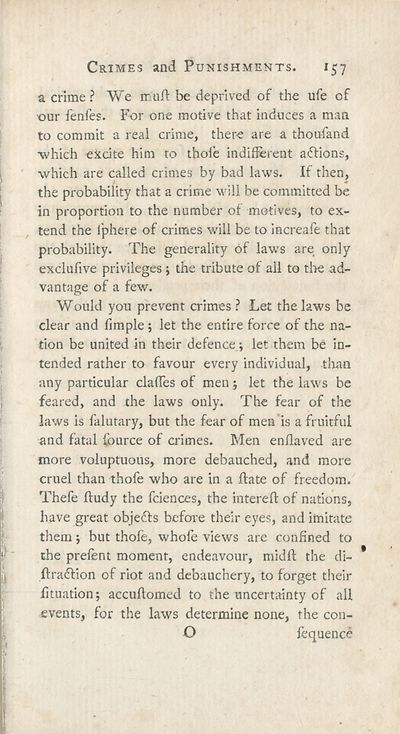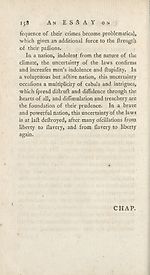Download files
Complete book:
Individual page:
Thumbnail gallery: Grid view | List view

Crimes and Punishments. 157
a crime? We muft be deprived of the ufe of
our fenfes. For one motive that induces a man
to commit a real crime, there are a thoufand
-which excite him to thofe indifferent aftions,
which are called crimes by bad laws. If then,
the probability that a crime will be committed be
in proportion to the number of motives, to ex¬
tend the fphere of crimes will be to increafe that
probability. The generality of laws are only
exclufive privileges; the tribute of all to the ad¬
vantage of a few.
Would you prevent crimes ? Let the laws be
clear and fimple ; let the entire force of the na¬
tion be united in their defence; let them be in¬
tended rather to favour every individual, than
any particular clafies of men; let the laws be
feared, and the laws only. The fear of the
laws is falutary, but the fear of men is a fruitful
and fatal fiaurce of crimes. Men enflaved are
more voluptuous, more debauched, and more
cruel than thofe who are in a ftate of freedom.
Thefe fludy the fciences, the interefl of nations,
have great objects before their eyes, and imitate
them j but thofe, whole views are confined to
the prelent moment, endeavour, midft the di- *
fixation of riot and debauchery, to forget their
fituation; accuftomed to the uncertainty of all
events, for the laws determine none, the con-
O fequence
a crime? We muft be deprived of the ufe of
our fenfes. For one motive that induces a man
to commit a real crime, there are a thoufand
-which excite him to thofe indifferent aftions,
which are called crimes by bad laws. If then,
the probability that a crime will be committed be
in proportion to the number of motives, to ex¬
tend the fphere of crimes will be to increafe that
probability. The generality of laws are only
exclufive privileges; the tribute of all to the ad¬
vantage of a few.
Would you prevent crimes ? Let the laws be
clear and fimple ; let the entire force of the na¬
tion be united in their defence; let them be in¬
tended rather to favour every individual, than
any particular clafies of men; let the laws be
feared, and the laws only. The fear of the
laws is falutary, but the fear of men is a fruitful
and fatal fiaurce of crimes. Men enflaved are
more voluptuous, more debauched, and more
cruel than thofe who are in a ftate of freedom.
Thefe fludy the fciences, the interefl of nations,
have great objects before their eyes, and imitate
them j but thofe, whole views are confined to
the prelent moment, endeavour, midft the di- *
fixation of riot and debauchery, to forget their
fituation; accuftomed to the uncertainty of all
events, for the laws determine none, the con-
O fequence
Set display mode to:
![]() Universal Viewer |
Universal Viewer | ![]() Mirador |
Large image | Transcription
Mirador |
Large image | Transcription
| Antiquarian books of Scotland > Crime & punishment > Essay on crimes and punishments > (159) |
|---|
| Permanent URL | https://digital.nls.uk/129849935 |
|---|
| Description | Thousands of printed books from the Antiquarian Books of Scotland collection which dates from 1641 to the 1980s. The collection consists of 14,800 books which were published in Scotland or have a Scottish connection, e.g. through the author, printer or owner. Subjects covered include sport, education, diseases, adventure, occupations, Jacobites, politics and religion. Among the 29 languages represented are English, Gaelic, Italian, French, Russian and Swedish. |
|---|

